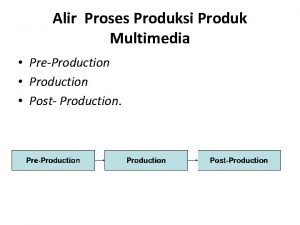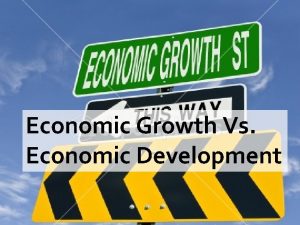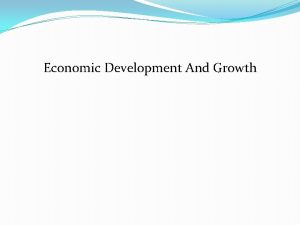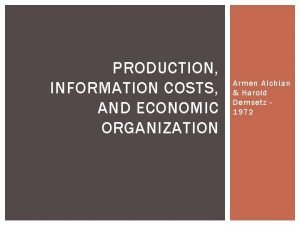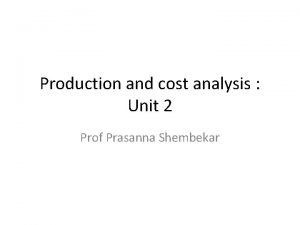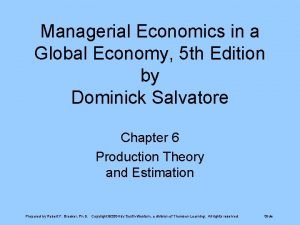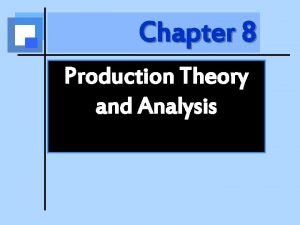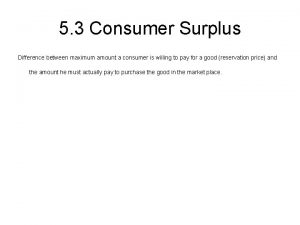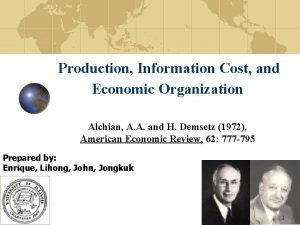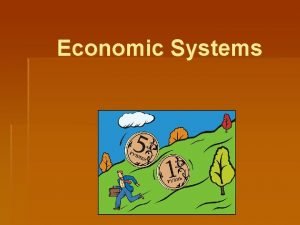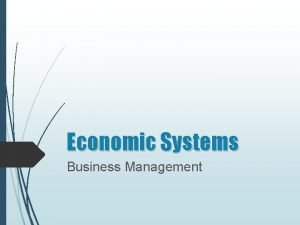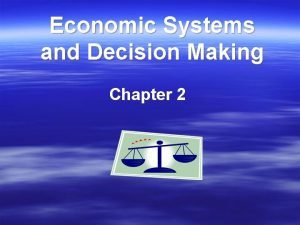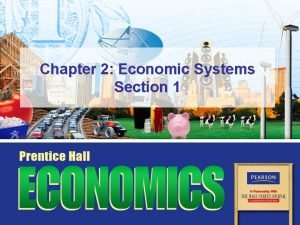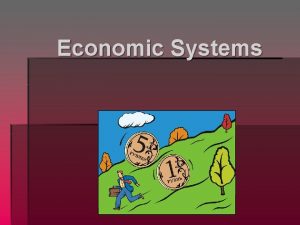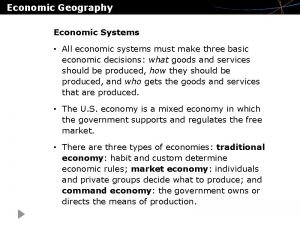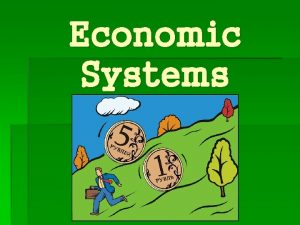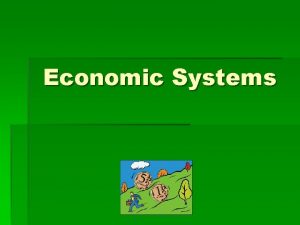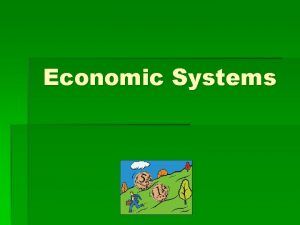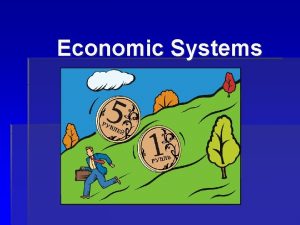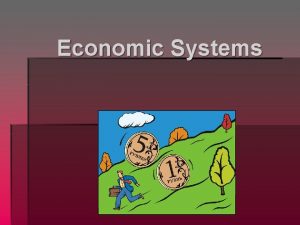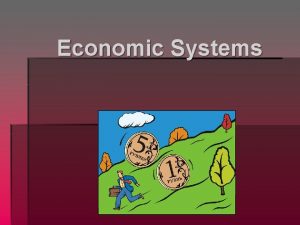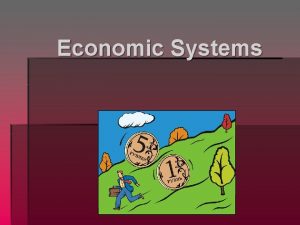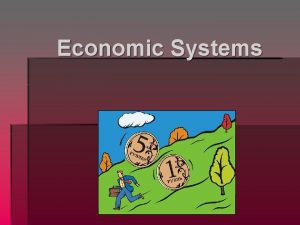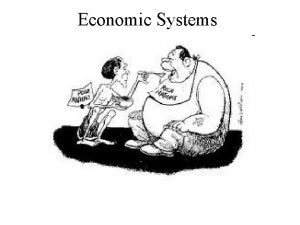Factors of Production ECONOMIC SYSTEMS Factors of production

















- Slides: 17

Factors of Production & ECONOMIC SYSTEMS

�Factors of production refers to inputs required for conducting production. �Input is the starting point of every production activity �According contributes production. " to Prof. towards Benham, output "Anything is a factor that of

Cntd. . �Factors of production are use for producing commodities �Factors of production are the resources the economy has available to produce goods and services. �Four factors of Production: 1. Land 2. Labor 3. Capital 4. Entrepreneur

Land �Land is the natural resources on the planet. It includes space on the ground, hills, seas, oceans, etc �Land natural resources are in limited supply. �The level of rent is related to scarcity. �There is a high rent for resources such as: Ø Ø Ø land in the central business district of the capital city beach-front land with roads and utilities Minerals, such as oil and gold

Labour �Labour is the human input (workers, managers etc) into the production process. �Each individual has a different level of skills, qualities and qualifications. This is known as there HUMAN CAPITAL. �This means human effort in any form – skilled or unskilled, manual or intellectual. �Labour earns wages or a salary in return for participation in the business

Capital �Man made physical goods used to produce other goods and services. �Examples include machines, computers, tools, factories, roads etc. �Increases in the level of capital are called INVESTMENT �The financial capital used to establish the business earns interest. �The interest is paid to the lender, who may be a bank, another institution, or an individual lender.

�Fixed capital is capital tied up in fixed assets, for example buildings, machinery, or vehicles. �Working capital is capital used for day-to-day operations. �It includes cash held in the bank, goods for sale, materials for processing and capital for other shortterm requirements �Venture capital is risk capital invested in a new business or one which is restructuring, usually for a period of years

Enterprises �The entrepreneur provides the initial ideas. �They risk their own resources in business ventures �They also organise the other 3 factors of production. � Organization of Enterprises means to plan a business, to start it and run it. �It means to bring the factors i. e. land, labour and capital together to undertake a business or production process

Economic Systems �An economic system is the system of production, distribution and consumption of goods and services of an economy �The economic system is composed of people and institutions, including their relationships to productive resources �It is the way in which a country manages the production and distribution of goods and services.

Capitalism � Economic system where the means of production are owned by private individuals � Government control and interference at a minimum � Private ownership of natural resources Permitted � Allocation of national resources determined by supply and demand � Competition eliminates inefficient producers, improves products, reduces costs � Private ownership of property permitted Critique of Capitalism � Private ownership means production leads inequality of wealth- rich get richer, poor get poorer � High cost of advertising � No government agency controlling production, creates waste by overproduction & duplication of effort � Profit is the motivation of production. Scarce resources wasted on goods and services that serve no useful purpose � Planning individual basis, leads to overproduction & waste

Socialism � Socialism is an economic system in which most means of production is owned and controlled by the government. � Socialists believe moving towards their goals of government ownership and control of production by gradual means � Government plans production by determining what produced and what quantity � Socialism, production determined by need not profit � Because government owns production, production can be planned and waste eliminated Critique of Socialism � Socialism lacks incentives for increasing effort. No motivating force � Determining “need” a problem which government unable to solve � Because government controls production, it also protects the inefficient producer � Because of improper government planning, both overproduction and underproduction can and do occur � Freedom of choice is somewhat limited under socialism

Communism � Communism an economic system, in theory, all goods owned collectively and payment of income based on need � Individuals given little freedom in determining what to produce � Everything owned collectively, private ownership of production prohibited � Individuals work to full potential w/compensation determined by government. In most controlled economies, incentives used to encourage work at full potential Difference between Communism and Socialism � Communists seek to end capitalism by revolution whereas socialists do it by ballot box � Socialists believe in orderly transfer for production from private to public ownership � Under socialism, fair payment is made for nationalized property � Socialism has high regard for an individual’s freedom

Mixed Economy �Mixed economy as the name suggests is an economy where all the activities related to production and other activities are carried out by participation of both government and private enterprises �The purpose of this system is to have social equality whereby the government is in control of certain fields and the individuals have the right to be in-charge of certain goods and services

Cntd… § Regulate private business to ensure that they do not mislead consumers, are careful about safety of their employees, do not cause excess pollution through their production process § Ensure adequate provision of social goods such as elementary education, health etc. § Promote welfare programs § Governments usually interfere with the market process is to promote Equity and Welfare

Features of Mixed Economic �Public Sector �Private Sector �Co-existence of Capitalistic and Socialistic Features �Planning: Economic planning �Regulation and Control of the Private Sector �Promotion of Public Welfare �Preservation of Freedoms: Freedom of choice of occupation

Advantages of Mixed Economy �Benefits of capitalist nature of private companies and socialist nature of government. �There is less inequality of income because intent of government is to have a balanced economic growth of an economy. �Mixed economy allows individuals to run their business and make profits but at the same time it places some responsibility on these companies by inducing them to contribute towards the welfare of society

Disadvantages of Mixed Economy �Production of goods and services which are beneficial for the society as a whole rather than producing those goods and services which in economic terms are more beneficial for an economy. �Under mixed economy private enterprises have to face lot of difficulty because of various government loopholes like favoritism and bureaucratic nature which is prevalent in mixed economy.
 Chapter 1 lesson 2 our economic choices worksheet answers
Chapter 1 lesson 2 our economic choices worksheet answers Yang merupakan pengertian production adalah
Yang merupakan pengertian production adalah Economic growth vs economic development
Economic growth vs economic development What is economic growth and development
What is economic growth and development Production, information costs, and economic organization
Production, information costs, and economic organization Economic region of production diagram
Economic region of production diagram Economic region of production diagram
Economic region of production diagram Marginal rate of technical substitution
Marginal rate of technical substitution The law of diminishing marginal rate of substitution
The law of diminishing marginal rate of substitution Production information costs and economic organization
Production information costs and economic organization Economic production quantity formula
Economic production quantity formula Education health and famine cloze notes
Education health and famine cloze notes What economic system is germany
What economic system is germany How many economic systems are there
How many economic systems are there How many economic systems are there
How many economic systems are there Chapter 2 economic systems and decision making
Chapter 2 economic systems and decision making Command economy political cartoon
Command economy political cartoon Chapter 2 economic systems answer key
Chapter 2 economic systems answer key

